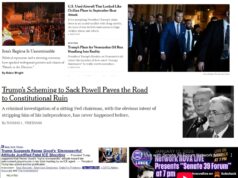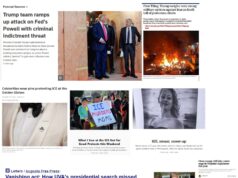From FWIW Virginia:
New outside groups online in Virginia
House GOP Caucus, teachers’ union launch digital ads targeting delegates
|
|
Welcome to FWIW Virginia, where we analyze digital spending trends on both sides of the aisle in the 2021 Virginia statewide and legislative elections. Each week, we look at how campaigns are investing in digital engagement and the online tactics they use to reach voters across the Commonwealth. Was this email forwarded to you? Click here to subscribe.
We wrote earlier this summer about the outside organizations spending money to influence the 2021 elections, and earlier this week, the organizations we track crossed the $200,000 spending mark on Facebook and Google ads. With Labor Day approaching and the campaign heating up, more and more money continues to flow into elections across the commonwealth.
Which organizations are investing in digital ads in Virginia? And what districts are they targeting? We take a look in this week’s edition of FWIW Virginia. But first…
2021 by the Numbers
FWIW, here are the top 10 spenders specifically targeting Facebook users in Virginia last week.
And here are the top 10 spenders specifically targeting Virginians on Google’s platforms.
Zooming out nationally, here is how total digital ad spending (national and local targeting) on Facebook and Google stacked up this week in Virginia’s statewide races.
Youngkin has continued to outspend McAuliffe on Facebook as the McAuliffe campaign continues to shift its digital ad spending towards Google platforms. This week, Youngkin’s team launched some interesting new :30 video creative on Facebook with direct-to-camera voter endorsements of Youngkin, including a Spanish-language spot from a small business owner and another from a self-identified “proud Democrat” who thinks Youngkin can “bridge the two parties.”
We’re also tracking cumulative digital ad spending across the state, including spending from candidates for statewide offices, competitive or potentially competitive Delegate races (any race under a 15 point margin in 2019), and partisan outside groups with spending specifically targeted at Virginia elections.
Democratic candidates and outside groups crossed $1 million in digital ad spending on Facebook and Google this week, outspending their Republican counterparts nearly two to one.
Much of this spending gap comes from Terry McAuliffe’s digital ad spending advantage over Glenn Youngkin at the top of the ticket. In the race for the House of Delegates, while Republican delegate campaigns have directly spent more than their Democratic counterparts, a seemingly coordinated digital effort by outside Democratic groups has swamped similar GOP efforts in spending, giving Democratic incumbents an early advantage in defining themselves with voters online.
New Outside Groups
We’ve been tracking digital ad spending from a number of outside groups all summer, and with the frantic post-Labor Day campaign stretch approaching, we’ve been picking up spending from new outside groups each week.
The most notable new spender we saw this week was the House Republican Caucus’ “Save Virginia” campaign, a new coordinated digital effort to counter the Democratic outside spending effort that we saw this summer. The Caucus spent just under $4,000 on Facebook from August 16th to 22nd on static and video ads attacking Democratic incumbents and challengers.
The ads deploy cheesy stock photos to hone in on rising inflation, tax increases, higher energy costs, and *murder rates* in Virginia, mirroring many of the same attacks we’ve seen throughout the summer from Youngkin’s campaign, especially the “tough on crime” playbook.
It’s unclear where the claims about voting for higher energy bills are coming from (a group of bipartisan lawmakers supported efforts earlier this year to rein in Dominion Energy), or why state lawmakers are responsible for macroeconomic trends like inflation, but the Virginia GOP seems set on making these key issues in the fall campaign.
So far, the ads are targeting Democratic candidates in 13 districts:
- Wendy Gooditis (HD 10)
- Chris Hurst (HD 12)
- Kelly Convirs-Fowler (HD 21)
- Debra Gardner (HD 27)
- Joshua Cole (HD 28)
- Elizabeth Guzman (HD 31)
- Dan Helmer (HD 40)
- Katie Sponsler (HD 66)
- Dawn Adams (HD 68)
- Schuyler VanValkenberg (HD 72)
- Rodney Willett (HD 73)
- Nancy Guy (HD 83)
- Alex Askew (HD 85)
The ads also give us a clear picture of the GOP’s highest priority districts as we head into the fall – all of the districts targeted are at least somewhat competitive (notably, HDs 21 and 68 we decided by more than 9 points in 2019), and all of the attack ads are focused on Democratic incumbents except for in HD 66, where the GOP is attacking Katie Sponsler in the must-win open seat contest.
Meanwhile, on the Democratic side, we picked up new digital ad spending on Facebook from the Virginia Education Association, which spent $7,670 on Facebook ads from August 16-22. The teachers’ union is running ads thanking vulnerable Democratic incumbents for their votes on education funding during the special session earlier this month.
So far, the group appears to be spending to support Dels. Wendy Gooditis (HD 10), Joshua Cole (HD 28), Dan Helmer (HD 40), Lashrecse Aird (HD 63), Schuyler VanValkenburg (HD 72), Rodney Willett (HD 73), Roslyn Tyler (HD 75), Nancy Guy (HD 83), and Alex Askew (HD 85).
The House GOP’s digital effort and the Virginia Education Association are among many outside organizations focused on the battle for the House of Delegates. We expect to keep finding more and more groups dropping money on these down ballot races as the top of the ticket campaigns continue to drive the majority of the spending in the commonwealth, and we’ll continue to track the influence of outside organizations on Virginia’s 2021 elections as the fall campaign heats up.
Thanks for reading this week’s FWIW Virginia! We’re so excited to be back following these critical elections in the Commonwealth. If you enjoy reading this type of content each week, we hope you’ll support our work by clicking share and tweeting out this newsletter below! As always, email us with ideas of what you’d like us to dive into next.
You can also sign up to receive our national newsletter, FWIW, here.











![Sunday News: “Trump Is Briefed on Options for Striking Iran as Protests Continue”; “Trump and Vance Are Fanning the Flames. Again”; “Shooting death of [Renee Good] matters to all of us”; “Fascism or freedom? The choice is yours”](https://bluevirginia.us/wp-content/uploads/2026/01/montage011126-238x178.jpg)





![[UPDATED 1/29/26] Audio: Sen. Tim Kaine Talks to Blue Virginia About His “Five-Point Plan” to Fight Trump’s Orban-Like Assault on US Democracy; Civil Disobedience a la MLK Jr.; Trump’s Bogus “Energy Emergency”; the Crucial Importance of the 2025 VA Elections; etc.](https://bluevirginia.us/wp-content/uploads/2025/02/kaineinterview2-100x75.jpg)
